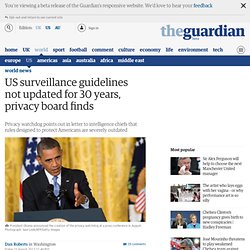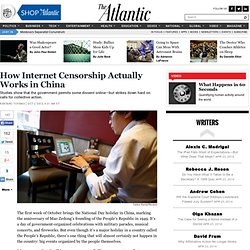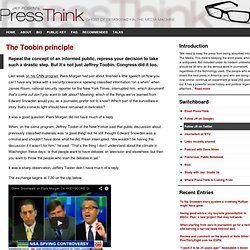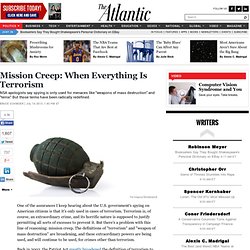

UK Government Admits Intelligence Services Allowed To Break Into Any System, Anywhere, For Any Reason. UK government: GCHQ is permitted to break into computers anywhere in the...
20150312_ISC_P%2BS%2BRpt%28web%29.pdf. Call for civil desobedience. FBI can activate laptop camera without even knowing. Mass Surveillance in America: A Timeline of Loosening Laws and P. US surveillance guidelines not updated for 30 years, privacy board finds. Barack Obama's new privacy watchdog has delivered its first bark, with a letter to intelligence chiefs urging them draft stronger rules on domestic surveillance, something it revealed had not been updated for 30 years.

The intervention of the Privacy and Civil Liberties Oversight Board, its first since the appointment of new staff by the White House earlier this year, came as Obama acknowledged that technology was outpacing the checks put in place to protect privacy and said the National Security Agency was "scary to people". "I think there are legitimate concerns that people have that technology is moving so quick that, you know, at some point, does the technology outpace the laws that are in place and the protections that are in place? ," said the president in a CNN interview that aired on Friday.
Obama Offers Plan Meant to Ease Concerns on Surveillance. US data scandal deepens EU-US divide on privacy. An International Perspective on FISA: No Protections, Little Ove. Comprendre le graphe social. La recette de Facebook, la nouvelle vedette des sites sociaux, c’est le « graphe social » (social graph), expliquait en mai dernier le jeune Mark Zuckerberg, son fondateur.

Le Graphe social désigne « le réseau de connexions et de relations entre les gens sur Facebook, qui permet la diffusion et le filtrage efficaces de l’information », traduisait à l’époque Francis Pisani. Le succès de Facebook est lié au couplage de la plate-forme et du réseau social, qui s’enrichissent l’un l’autre grâce à une intégration réussie, en séduisant utilisateurs et développeurs.
En permettant de voir les relations entre les gens, en instaurant une confiance dans les applications recommandées par ses « amis », en bénéficiant du dynamisme de l’appropriation : le réseau filtre les informations qu’il vous propose. La carte des relations est-elle le territoire ? L’expression n’a pas que des admirateurs.
En tout cas, le concept ne cesse d’être discuté. En attendant, l’idée fait réagir même au plus haut niveau.
Threat to 21at century Gulag. Academics Against Mass Surveillance. Hacking and Philosophy: Surveillance State. The state should be exposing the cyber-snoops, not joining them. What The Government Could Do With All That Location Data. Germany calls in UK ambassador over spy claims. Five things you need to know about the transatlantic wiretap sca. People are getting concerned. Spying is classified document not to receal. E-mail's Big Privacy Problem: Q&A With Silent Circle Co-Founder.
What Happens If A-Rod's Battle With Baseball Gets Really Ugly An. The Public-Private Surveillance Partnership. Agreement between Indian telcos and U.S. government oblige surve. How Internet Censorship Actually Works in China. Studies show that the government permits some dissent online—but strikes down hard on calls for collective action.

Carlos Barria/Reuters The first week of October brings the National Day holiday in China, marking the anniversary of Mao Zedong’s founding of the People’s Republic in 1949. It’s a day of government-organized celebrations with military parades, musical concerts, and fireworks. But even though it’s a major holiday in a country called the People’s Republic, there’s one thing that will almost certainly not happen in the country: big events organized by the people themselves.
It’s no secret that the Chinese government dislikes mass protests. King believes Internet censorship in China is the “most extensive effort to selectively censor human expression ever implemented.” Two points stand out among their findings. The Chinese Communist Party made a promise of democratic, constitutional government at the beginning of the war of resistance against Japan.
The Toobin principle. Aug.6 Last week on his CNN program Piers Morgan had just about finished a little speech on how you can’t have any bloke with a security clearance spewing classified information “on a whim” when James Risen, national security reporter for the New York Times, interrupted him: which document that’s come out don’t you want to talk about?

Meaning: which of the things we’ve learned from Edward Snowden would you, as a journalist, prefer not to know? Mission Creep: When Everything Is Terrorism. NSA apologists say spying is only used for menaces like "weapons of mass destruction" and "terror.

" But those terms have been radically redefined. One of the assurances I keep hearing about the U.S. government's spying on American citizens is that it's only used in cases of terrorism. Terrorism is, of course, an extraordinary crime, and its horrific nature is supposed to justify permitting all sorts of excesses to prevent it. But there's a problem with this line of reasoning: mission creep. The definitions of "terrorism" and "weapon of mass destruction" are broadening, and these extraordinary powers are being used, and will continue to be used, for crimes other than terrorism. Back in 2002, the Patriot Act greatly broadened the definition of terrorism to include all sorts of "normal" violent acts as well as non-violent protests. TMW2013-06-12colo2.png 550×508 pixels.
Obscured by Clouds or How to Address Governmental Access to Clou. On whistleblowers and government threats of investigation. UN report: The link between State surveillance and freedom of ex. A.HRC.23.40_EN.pdf.